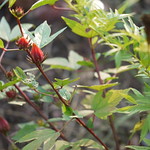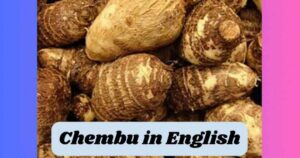Gongura in English
- English name of Gongura is “Sorrel leaves” or “Roselle leaves.”.
Gongura in Hindi
- Hindi name of Gongura is “Pitwaa”.

Gongura is a leafy green vegetable widely cultivated and consumed in South India, particularly in the states of Andhra Pradesh and Telangana. It is scientifically known as Hibiscus sabdariffa. “Gongura” is a term derived from two Telugu words: “gongu” and “koora,” which translate to “sorrel” and “vegetable” respectively. This leafy green vegetable comes in two primary varieties: red and white, with the red variety being particularly esteemed for its enhanced nutritional content and medicinal properties.
In English, Gongura is named as “sorrel leaves” or “roselle leaves.” The plant belongs to the hibiscus family and is characterized by its distinctive tangy flavor, which sets it apart in culinary applications.
The leaves of the Gongura plant are deeply veined and come in varying shades of green and red. They are known for their sour taste, which adds a unique zing to dishes. Gongura is highly versatile and is used in various culinary preparations, including chutneys, curries, stews, and pickles. Its tartness makes it a popular ingredient in both vegetarian and non-vegetarian dishes, lending a refreshing acidity to the overall flavor profile.
In addition to its culinary uses, Gongura is also valued for its potential health benefits. It is rich in vitamins, minerals, and antioxidants, and is believed to have medicinal properties, including anti-inflammatory and anti-microbial effects. In Indian traditional medicine, Gongura is sometimes used to alleviate digestive issues and promote overall well-being. Overall, Gongura holds a special place in South Indian cuisine, prized for its distinctive taste and potential health benefits.
Gongura Recipes
Gongura is used in preparing both vegetarian and non-vegetarian dishes. From traditional favorites like Gongura Pachadi, a zesty chutney, to innovative dishes like Gongura Chicken Curry, these recipes showcase the versatility of this South Indian staple. Whether incorporated into dal, rice, or meat dishes, Gongura adds a unique sour flavor that tantalizes the taste buds. Additionally, Gongura Pickle offers a tangy condiment option, while Gongura Pulihora provides a flavorful twist to traditional rice dishes.
Some of the popular Gongura Recipes:
- Gongura Pappu
- Gongura Pachchadi
- Gongura Thokku
- Gongura Chutney
- Gongura Fish Fry
- Gongura Mutton Curry
- Gongura Chicken Curry
- Gongura Pulihora
- Gongura Pulusu
- Gongura Prawns Fry
- Gongura Pickle
- Gongura Paneer
- Gongura Fish Curry
- Gongura Potato Fry
- Gongura Egg Curry
Gongura Benefits:
The health benefits of Gongura are endless.
- Rich in Nutrients: Gongura leaves contains essential vitamins and minerals, including vitamin C, iron, calcium, and antioxidants, promoting overall health and well-being.
- Digestive Aid: The high fiber content in Gongura helps regulate digestion.
- Prevents Constipation: Gongura prevents constipation, and promotes a healthy digestive system.
- Anti-inflammatory Properties: Gongura has many anti-inflammatory compounds that may help reduce inflammation in the body, alleviating symptoms of conditions like arthritis and inflammatory bowel disease.
- Cardiovascular Health: The presence of antioxidants in Gongura leaves helps lower cholesterol levels, regulate blood pressure, and reduce the risk of heart disease.
- Immune Boosting: The vitamin C content in Gongura boosts the immune system, helping the body fight off infections and illnesses.
- Weight Management: Gongura is low in calories and fat, making it an excellent addition to a weight loss or weight management diet.
- Skin Health: The antioxidants in Gongura promote healthy skin by fighting free radicals and reducing signs of aging.
- Hair Health: The iron content present in Gongura supports hair growth and prevents hair loss.
- Detoxification: Gongura leaves act as a natural detoxifier, helping to cleanse the body of toxins and impurities, thus promoting overall detoxification and well-being.







